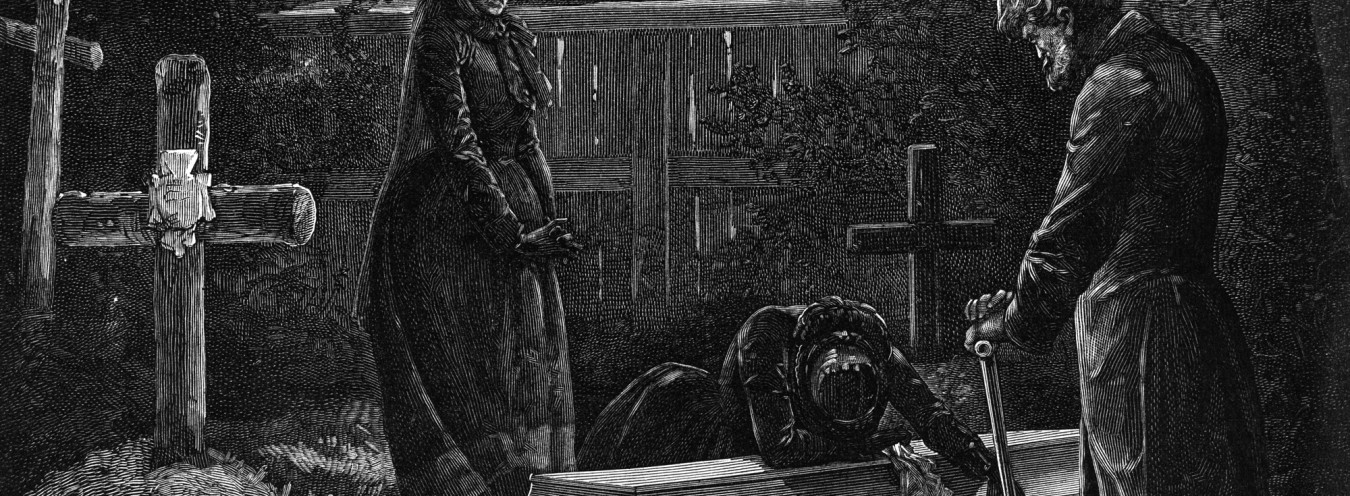
Suicide
It’s clear, after all, that Staś killed himself in Zasław. […] If he’d wanted to kill himself, he could have done so long ago. Besides, a revolver would have sufficed, not dynamite,’ Rzecki answered. He has killed himself… But he was a crazy fool in all respects, and a revolver wasn’t enough. He needed a railroad train… Suicides can be choosy, I know that! (732)
The recurring appearances of the motif of suicide in The Doll emphasise the novel’s investment in the themes of decadence, fin de siècle, and declining values. In the text, suicides are committed chiefly by men, which is related to the causes of such acts. Besides those resulting from despair due to a disappointment in love or life, there are suicides or suicide attempts meant to defend one’s honour (e.g. military men after a surrender and tradesmen accused of embezzlement or in danger of going bankrupt, like the cashier Oberman, who swore he would kill himself because of lost money).
The characters in Prus’s novel use a pistol (the quiet August Katz, Ignacy Rzecki’s friend and brother-in-arms, shoots himself after the defeat of the Hungarian Revolution) or poison (after his fiancée’s death, Michał Szuman tries to poison himself with chloroform but is saved by a friend who breaks down the door. Looking back on the event years later, the caustic doctor remembers it thus: The worst kind of charity! I had to pay for the door he smashed, and my colleague inherited my practice by pronouncing me insane). The most dramatic suicide caused by despair would have been Wokulski’s. The novel depicts his two potential suicide attempts: first when he throws himself onto the railroad track (some researchers consider the locomotive to be positivism’s favourite symbol of progress crushing the disillusioned idealist), and potentially later, he blows himself up along with the ruins of the castle in Zasławek. Doctor Szuman (who claims, incidentally, that one should never interfere with a suicide) is much more shocked by his friend’s capriciousness in choosing methods of self-destruction than by the decision itself, which he sums up angrily: From this I deduce that our dear Staś had suicidal mania as well as his romanticism.
The main character of Prus’s novel has been tormented by suicidal thoughts for a long time; he is haunted by illusions or even dreams (in Paris) about suicide, vivid enough for the mysterious Professor Geist he encounters there to immediately recognise him as a would-be desperate man. He says calmly, I have had four suicides in my laboratory and offers Wokulski an opportunity to sacrifice his life on the altar of science by taking part in dangerous scientific experiments.
In nineteenth century culture the epidemic of suicide originated from a literary model found in The Sorrows of Young Werther by J. W. Goethe, whose hero expresses his rebellion against the existing world order in the dramatic guise of making an attempt on his own life. From a legal perspective, suicide was considered a crime. The punishment provided for suicides in the penal code of the time (Articles 944, 948) was rendering their testaments null and void as well as denying them a Christian burial. Additionally, survivors had to undergo Church penance. At the same time, however, Article 946 of the same code (in force in Congress Poland in Prus’s time) stated that persons who committed or attempted suicide are exempt from any sanctions if they have done so in defence of honour (for example: military men, officials protecting state secrets, or women threatened with rape).
On the other hand, the attempts on one’s life mentioned in The Doll are occasionally also empty gestures. Once his fraud and deception comes to light, Mr Maruszewicz threatens Wokulski with suicide (and murder) in a theatrical scene. Mr Szastalski – one of Izabela Łęcka’s admirers – widely announces his intention of committing suicide, which makes him irresistibly charming to ladies. The old clerk also mentions suicides in his diary in jocular tones: for example, when in the tomb-like atmosphere of the distraught Helena Stawska’s house he feels calm desperation and says, I was certain that the proceedings over the doll would terminate in wholesale suicide; or when he recalls the Mincel brothers’ arguments – angry with Jan, Franz would not speak to him, but at the wedding he danced [Jan’s] wife off her feet and drank himself silly on his wine.
→ Decadent Movement; → Szuman, Michał; → Wokulski, Stanisław;
Bibliografia
- Encyklopedyja powszechna S. Orgelbranda, vol. 22, Warsaw 1862.
- M. Jarosz, Samobójstwa. Ucieczka przegranych, Warsaw 2004.
- S. Chwin, Samobójstwo jako doświadczenie wyobraźni, Gdańsk 2010.



